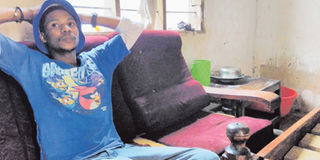Two young men forge for success in the city

Raimond sits on his sofa, his arms crossed behind his head. Just like many youth, PHOTO I HANSJURG JAGER
What you need to know:
- Moving to the city is a step taken by the thousands of young people who leave rural areas every year in the hope of a better life.
Elias and Raimond are both from the countryside. Both grew up in small and stable families. But while Elias is working towards his goals and aspirations, Raimond is desperately searching for his future.
Elias sits on his bed, behind him the orange curtain blows slightly in the warm afternoon wind, which is cooling the heat in the city centre of Dar es Salaam. His hands are resting on his knees, the big, dark eyes wandering around in his room. To his left, between his bed and the yellow-painted wall two suitcases lie on the floor. In them the few clothes he possesses. On the shelf beside him is his jacket on top, including a messy stack of lecture notes of the Tumaini Dar es Salaam College (Tudarco). Elias studies communication science in the fourth semester and specializes in public relations, PR.
In the corner, right to the shelf stands a gas cooker, on which two pans, in between two white plates and a wooden spoon, stack. The wooden door opens to a third and leads to the inner courtyard. A child, about 12 years old, washes clothes in a plastic bowl. Between the two huts two wires serve as clotheslines. The inner courtyard is surrounded by a wall. In front of the door is a sidewalk which leads about one meter above the ground to the nearest huts. The meadow is cluttered with waste, a few chicken are digging in. In the back, sugarcane-plants are growing.
In the rainy season, the small river behind the huts drains waste and excrement from the huts through the area. “In the rainy season people are often sick here. Cholera ... “ Elias says. Kijitonyama is one of the places in Dar es Salaam, where people reside.
“It’s cheap,” says Elias. Each month he pays little more than 45,000 Tanzanian shillings, which corresponds to the equivalent of a lunch meal in an upper-class restaurant in Dar es Salaam.
When Elias speaks English, he thinks long before he says anything. Sometimes the right angle of his mouth twitches, as if he wanted to speak before he thought it over. “I want a better life,” he says several times. Once he finishes with his studies, he would like to convince future employers how he can be used as a “full man”. But until then, it is still a long way. He still has a full year before he graduates with a bachelors degree.
Education expenses
Elias also works as an intern at a media house in Dar. He writes about court decisions in the city, reports on press conferences and other events. “I was lucky that I could take all my courses in the afternoon,” says Elias. Considering the high cost of tuition fee, Elias cannot refrain from working. Tuition fee costs him Sh2.5million, the government carries a million shillings. The other Sh1.5million he has to pay on his own. Even with the additional money he earns with the internship, Elias must turn every shilling twice. “I can only afford to study if I keep my life costs low,” he says.
The state pays a fixed amount for accommodation, food and transport, but Elias uses a large part of this money to subsidize his study fees. “That’s why I have to make it through the day with 5000 shillings,” he says. For food and enough water, Elias would have to spend 3500 to 4000 shilling. If he has to go somewhere using the daladala, there’s an additional cost of 800 to 1600 shillings to pay for the tickets.
In the search for a better life, Elias moved from Mwanza to Dar es Salaam three years ago. This is a step taken by the thousands of young people who leave rural areas every year in the hope of a better life.
Raimond is also a hillbilly from Nyakato, located in Mwanza district. The 25-year-old is the oldest of four children and has been trying his luck in Dar Es Salaam for a year and a half. So far the city has disappointed him. Raimond works from time to time in the slaughterhouse in Vingunguti, but he is actually unemployed. He lives three hundred meters away from the slaughterhouse, in the slums of the growing city of Dar Es Salaam.
Raimond sits on his sofa, his arms crossed behind his head. The blue sweater with the white sleeves is washed out and has already seen better days. His Nike sneakers are frayed, the sole slowly dissolves from the lining.
Raimond lives in a solid brick hut, a corrugated roof protects against the sun and rain. The hut itself does not have any electricity. Half of the room is occupied by a bed with slatted floor but without a mattress. On the grate stands a green small gas cooker. On the left, between the bed and the wall stands an aluminum plate with a turned aluminum pot on a small table. The pot serves as a cover for the Ugali that Raimond has left over. He will eat it later. At the moment, it is the only thing he can afford. Between the huts, wires are lined with linen. In the warm wind the colourful pants, t-shirts and shirts blow gently back and forth.
Aspirations
Outside, Raimond has stated that he would like to open a small library in the future. He wants to borrow and sell films and music. He could at least get a little bit closer to his desire to become a musician. The fact that he is doing a business that violates copyrights, plays no role for Raimond. “Sometimes I do not have enough money to buy food,” he says. And this is a new experience for the son of small farmers.
“Before, we always had enough to eat. Three times a day.” In Dar Es Salaam, he often can only afford one meal a day. For a second meal, it is enough if his colleague helps him out with money or if he finds some work in Vingunguti. Raimond left school after 9 years (form IV) and since then has been working with occasional jobs.
“I do not have anyone in town, I’m alone,” he says today. His family is far away, with his lessor he is more or less clear and he does not like the work in the slaughterhouse. Even if he could apply for a position, he lacks the money to pay the usual “employment fee”.
Some employers only consider someone if they pay bribes. In most cases, it is between one and three monthly salaries, which will put future workers on the table to get a chance. Apart from the fact that Raimond has no formal training, he also lacks the money to be able to apply regularly.
And his dream of becoming a musician has also disappeared into thin air. “I’m willing to give up on making music if I can make a little more money,” he says. His broad laughter disappears, his gaze goes empty.
He knows that the work in Vingunguti does not make him progress any further. But he does not know how to free himself from this poverty trap and build an existence in Dar Es Salaam – or Bongo, as it is called in slang. To make it in this city, one needs to use his brain if he or she wants to make a living.
In contrast to Elias, Raimond is desperate and helpless. The city overcame him and he does not like the many people living here. He sees the only hope in foreigners, who could help him with some capital. He says several times that he needs some money - Sh300,000 - and a computer.
With the money he would buy films and CD-blanks and something to eat. Raimond imagines how he earns his livelihood with the film rental and -sale and with the illegally copied CD’s.
How he could further develop his small mini-company does not matter to him as long as he gets some money in his pocket.




